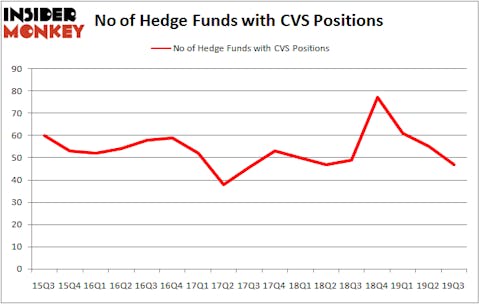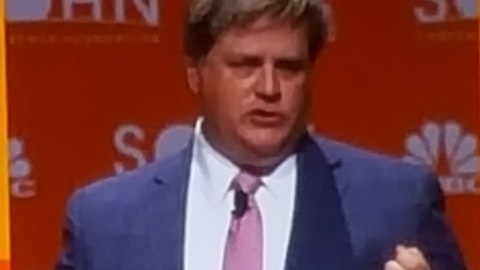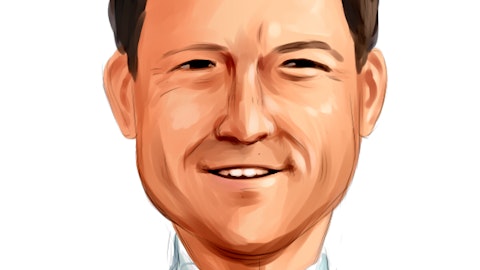Although the masses and most of the financial media blame hedge funds for their exorbitant fee structure and disappointing performance, these investors have proved to have great stock picking abilities over the years (that’s why their assets under management continue to swell). We believe hedge fund sentiment should serve as a crucial tool of an individual investor’s stock selection process, as it may offer great insights of how the brightest minds of the finance industry feel about specific stocks. After all, these people have access to smartest analysts and expensive data/information sources that individual investors can’t match. So should one consider investing in CVS Health Corporation (NYSE:CVS)? The smart money sentiment can provide an answer to this question.
CVS Health Corporation (NYSE:CVS) has seen a decrease in enthusiasm from smart money of late. CVS was in 47 hedge funds’ portfolios at the end of the third quarter of 2019. There were 55 hedge funds in our database with CVS positions at the end of the previous quarter. Our calculations also showed that CVS isn’t among the 30 most popular stocks among hedge funds.
So, why do we pay attention to hedge fund sentiment before making any investment decisions? Our research has shown that hedge funds’ small-cap stock picks managed to beat the market by double digits annually between 1999 and 2016, but the margin of outperformance has been declining in recent years. Nevertheless, we were still able to identify in advance a select group of hedge fund holdings that outperformed the Russell 2000 ETFs by 40 percentage points since May 2014 (see the details here). We were also able to identify in advance a select group of hedge fund holdings that underperformed the market by 10 percentage points annually between 2006 and 2017. Interestingly the margin of underperformance of these stocks has been increasing in recent years. Investors who are long the market and short these stocks would have returned more than 27% annually between 2015 and 2017. We have been tracking and sharing the list of these stocks since February 2017 in our quarterly newsletter. Even if you aren’t comfortable with shorting stocks, you should at least avoid initiating long positions in stocks that are in our short portfolio.

Frank Brosens of Taconic Capital
Unlike the largest US hedge funds that are convinced Dow will soar past 40,000 or the world’s most bearish hedge fund that’s more convinced than ever that a crash is coming, our long-short investment strategy doesn’t rely on bull or bear markets to deliver double digit returns. We only rely on the best performing hedge funds‘ buy/sell signals. Let’s check out the key hedge fund action regarding CVS Health Corporation (NYSE:CVS).
How have hedgies been trading CVS Health Corporation (NYSE:CVS)?
At Q3’s end, a total of 47 of the hedge funds tracked by Insider Monkey were bullish on this stock, a change of -15% from one quarter earlier. By comparison, 49 hedge funds held shares or bullish call options in CVS a year ago. So, let’s review which hedge funds were among the top holders of the stock and which hedge funds were making big moves.

The largest stake in CVS Health Corporation (NYSE:CVS) was held by Citadel Investment Group, which reported holding $192.3 million worth of stock at the end of September. It was followed by Adage Capital Management with a $99.2 million position. Other investors bullish on the company included D E Shaw, Pzena Investment Management, and Millennium Management. In terms of the portfolio weights assigned to each position Healthcare Value Capital allocated the biggest weight to CVS Health Corporation (NYSE:CVS), around 5.7% of its portfolio. Bourgeon Capital is also relatively very bullish on the stock, setting aside 4.01 percent of its 13F equity portfolio to CVS.
Seeing as CVS Health Corporation (NYSE:CVS) has witnessed falling interest from the smart money, it’s safe to say that there is a sect of fund managers who sold off their positions entirely in the third quarter. At the top of the heap, Matthew Tewksbury’s Stevens Capital Management said goodbye to the largest investment of the 750 funds monitored by Insider Monkey, totaling an estimated $24.2 million in call options. Benjamin A. Smith’s fund, Laurion Capital Management, also dropped its call options, about $21.1 million worth. These bearish behaviors are important to note, as aggregate hedge fund interest was cut by 8 funds in the third quarter.
Let’s now review hedge fund activity in other stocks similar to CVS Health Corporation (NYSE:CVS). These stocks are Itau Unibanco Holding SA (NYSE:ITUB), Fidelity National Information Services Inc. (NYSE:FIS), Banco Santander (Brasil) SA (NYSE:BSBR), and Stryker Corporation (NYSE:SYK). This group of stocks’ market valuations resemble CVS’s market valuation.
| Ticker | No of HFs with positions | Total Value of HF Positions (x1000) | Change in HF Position |
|---|---|---|---|
| ITUB | 17 | 1060568 | -1 |
| FIS | 90 | 7126015 | 31 |
| BSBR | 14 | 125130 | 3 |
| SYK | 33 | 527278 | 3 |
| Average | 38.5 | 2209748 | 9 |
View table here if you experience formatting issues.
As you can see these stocks had an average of 38.5 hedge funds with bullish positions and the average amount invested in these stocks was $2210 million. That figure was $925 million in CVS’s case. Fidelity National Information Services Inc. (NYSE:FIS) is the most popular stock in this table. On the other hand Banco Santander (Brasil) SA (NYSE:BSBR) is the least popular one with only 14 bullish hedge fund positions. CVS Health Corporation (NYSE:CVS) is not the most popular stock in this group but hedge fund interest is still above average. Our calculations showed that top 20 most popular stocks among hedge funds returned 34.7% in 2019 through November 22nd and outperformed the S&P 500 ETF (SPY) by 8.5 percentage points. Hedge funds were also right about betting on CVS as the stock returned 20.3% during the fourth quarter (through 11/22) and outperformed the market. Hedge funds were rewarded for their relative bullishness.
Disclosure: None. This article was originally published at Insider Monkey.




